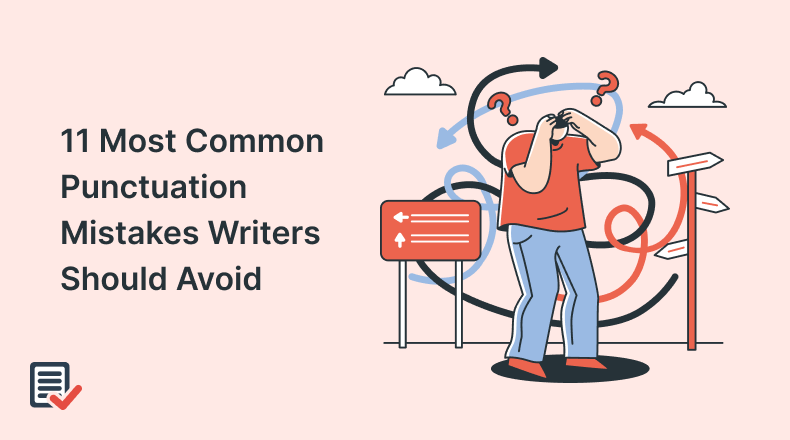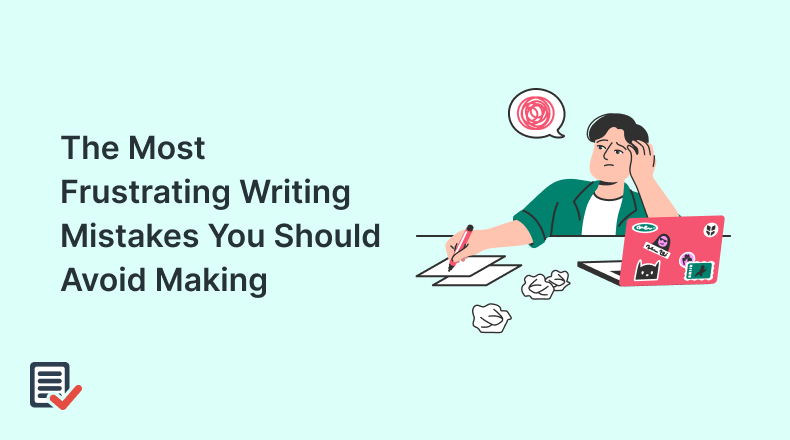
Punctuations–even though they are too little and seem neglectable, in reality, they hold great importance in English grammar. They have the power to either make or break your entire sentence.
However, no matter how hard we practice, there are some common punctuation issues that almost every writer has faced. It can be wrong comma placement, incorrect apostrophe placement, or misplacing colon and so on.
In this article, we are going to cover a list of 11 common punctuation mistakes that every writer should avoid. So, without wasting time, let’s get started.
11 Common Punctuation Mistakes
Do you know what’s the most effective way to avoid punctuation mistakes? Yes, first is the universal rule—practice. Whenever you write something, pass it through a reliable punctuation checker to learn about your punctuation mistakes. The 11 most common punctuation errors every writer makes are listed below.
1. Missing Commas in Compound Sentences
Sometimes, you need to include commas in compound sentences to make sure your writing is clear. It’s common in sentences with words like and, but, or, and yet. Commas might seem a little overrated part of punctuation, but do you know missing it between two independent clauses can stumble the readers?
Let’s understand with an example:
Incorrect: I wanted to go to the concert but I had too much work.
Correct: I wanted to go to the concert, but I had too much work.
Do you see the difference? Comma gives readers a natural pause. Without it, your sentence will probably look rushed and awkward.
2. Excessive Use of Commas
Another major punctuation issue is overusing commas. While missing commas makes your writing rushed, excessively using them can make it look choppy and hard to follow. Writers usually add commas everywhere they pause in speech, which honestly isn’t always correct. Each comma should have a purpose, not just a pause.
Incorrect: She walked down the street, slowly, admiring the view, and thinking about her day.
Correct: She walked down the street slowly, admiring the view and thinking about her day.
Notice how the corrected sentence flows better? Each comma here serves a real need—makes your sentence easier to read.
3. Confusion Between “Its” and “It’s”
Although this punctuation error is common but easily avoidable. It’s important to understand the fine-lined difference—” Its” is possessive, meaning something belongs to it. Whereas “It’s” is a contraction for it is. Therefore, misusing these can change the meaning of your sentence.
Incorrect: The dog lost it’s collar.
Correct: The dog lost its collar.
4. Incorrect Use of Apostrophes for Plurals
Adding an apostrophe to pluralize words is now a common mistake. Most writers don’t understand that apostrophes show possession, not plurality. Hence, adding an apostrophe before an “s” in plurals is never correct.
Incorrect: The cat’s are sleeping on the couch.
Correct: The cats are sleeping on the couch..
5. Using Semicolons Incorrectly
Semicolons are often used to connect two closely related independent clauses. For instance, if you think each part of the sentence could stand alone, then a semicolon might work. However, they can’t replace a comma, and they can’t stand alone.
Incorrect: I love reading; especially novels.
Correct: I love reading; I especially enjoy novels.
6. Misplacing Quotation Marks
Quotation marks can be tricky. In American English, punctuation marks like commas and periods go inside the quotation marks. In British English, it’s the opposite.
Incorrect: “We’re going to win”, he said.
Correct: “We’re going to win,” he said.
Does this feel like a minor detail? It may be, but consistent errors in quotation placement can make your writing look sloppy.
7. Unnecessary Exclamation Marks
Exclamation marks should be used sparingly. Too many of them can make your writing sound overly exciting or less professional. Whereas, a single exclamation mark can be used as a powerful weapon to add emphasis and emotions to your writing.
Incorrect: I can’t wait to see you!!!
Correct: I can’t wait to see you!
8. Misusing Dashes and Hyphens
Hyphens and dashes are often mistaken as the same thing, but, in reality, they serve different purposes. Hyphens connect words, like in well-known, while dashes set off phrases. Mixing these up can make sentences unclear.
Incorrect: The well known author–a favorite of mine–was signing books.
Correct: The well-known author—a favorite of mine—was signing books.
As you see, the second sentence adds more clarity and style to your writing.
9. Using Too Many Ellipses
Ellipses (…) show pauses or trailing thoughts, but they’re often overused. When added excessively, ellipses make writing look incomplete or unsure. Therefore, they’re most effective when sparingly used to add subtle emphasis and make your sentences sound more powerful and confident.
Incorrect: I think… we should… start over… with this idea.
Correct: I think we should start over with this idea.
10. Misplacing Colons
Colons introduce lists, explanations, or examples, but they should only follow complete sentences. Thus, adding a colon where it doesn’t belong can break the flow and confuse readers.
Incorrect: The workshop covers: grammar, punctuation, and style.
Correct: The workshop covers three areas: grammar, punctuation, and style.
11. Overcapitalization for Emphasis
Have you ever found excessive capitalization distracting? Sometimes, writers capitalize random words to emphasize them, but in reality, this makes the writing look unprofessional. It’s important to understand that capital letters are used to start a sentence or to represent a proper noun. Thus, it has no link with adding extra weight to random words. So, it is essential to learn the proper capitalization rules to avoid this mistake and make your message more clear and polished.
Incorrect: I have a Big Announcement for you today.
Correct: I have a big announcement for you today.
Conclusion:
Mark it—punctuation mistakes can weaken your writing and confuse readers. Each mark has a specific role, and using them correctly improves clarity and professionalism. So, by avoiding common mistakes, you can enhance your writing significantly. Always proofread your writing to look for missing commas, misplaced apostrophes, and other issues. A well-punctuated piece makes your message clearer and more engaging.





![20 Most Common Grammar Mistakes & How to Avoid Them [With Examples]](https://www.check-plagiarism.com/blog/wp-content/uploads/2024/11/790-X-440.png)
